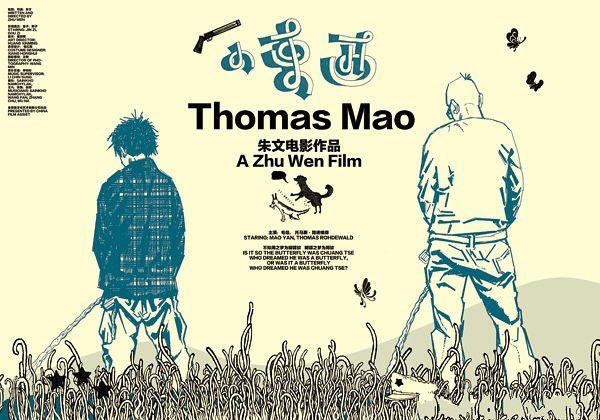Story
The remote grasslands of Inner Mongolia, China, August 2008. While the Olympic Games are taking place in Beijing, dour European artist Thomas (Thomas Rohdewald) arrives at the ramshackle lakeside inn of the excitable Mao (Mao Yan), orginally from Hunan province. Thomas intends to stay three days to sketch. Neither speaks the other's language but they start to share the same dreams: of a pair of lovers in Ancient China who engage in a love duel, and of aliens who land one night near the inn.
Review
Thomas Mao 小東西 (2009) is the artiest but also the most accessible of the three films ZHU Wen 朱文 has made to date: it's much better constructed than the over-discursive Seafood 海鮮 (2001) and much more original in its ideas than South of the Clouds 雲的南方 (2003). Zhu is more a writer who occasionally directs than a director with a consistent film-making vision or style — both Seventeen Years 過年回家 (1999) and In Expectation 巫山云雨 (1995), which he contributed to, were directed by other hands — but with Thomas Mao he has at least learnt the value of brevity when attached to a good concept.
The film initially looks like being a low-key comedy about east-west cultural misunderstandings, as the odd couple of a dour Luxembourger and excitable Chinese (neither of whom speaks the other's language) are closeted together in a shack in the middle of nowhere for three days. Simply on that level it's both pointed and entertaining, avoiding situational cliches and going more for a behavioural approach. But early on, magical touches start to appear (Mao pushing smoke out of his ears, or dexterously catching a hurled sweetcorn) that announce an extra level to the movie: for example, the riveting love-action ballet between two dream figures that takes a whole seven minutes in a film that's only just over an hour long. Finally, in a coda that's separate from the main film, Zhu completely redefines the two men's relationship — and, by implication, the film itself.
This last section would have much better at half its length, shorn of a silly third character, as the revelation of the real-life artistic relationship between Thomas ROHDEWALD and MAO Yan 毛焰 is fascinating and magical enough on its own. And at one hour, rather than 76 minutes, the film itself would have been better: it's still a scratchbook of ideas rather than a fully developed movie. On a technical level it looks good, with WANG Min 王敏's digital photography of the Inner Mongolian grasslands setting always appositely composed, and the two main performances are what they are.
The Chinese title, which literally means Small Things, also contains an internal pun on "east" (dong) and "west" (xi), whose characters make up the Chinese word for "things". The pun is mirrored in the English title which conflates the two characters' names into one.
